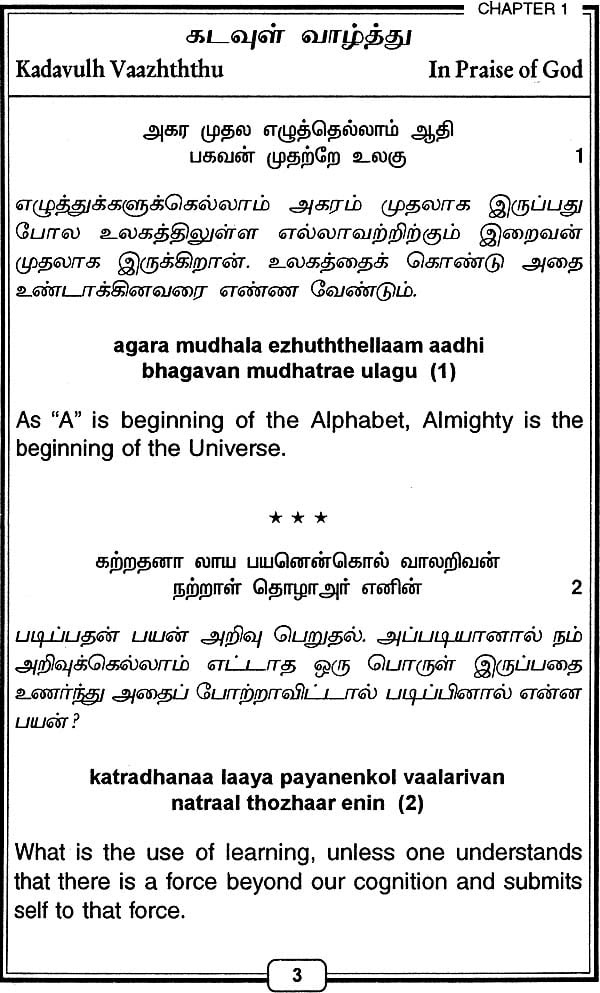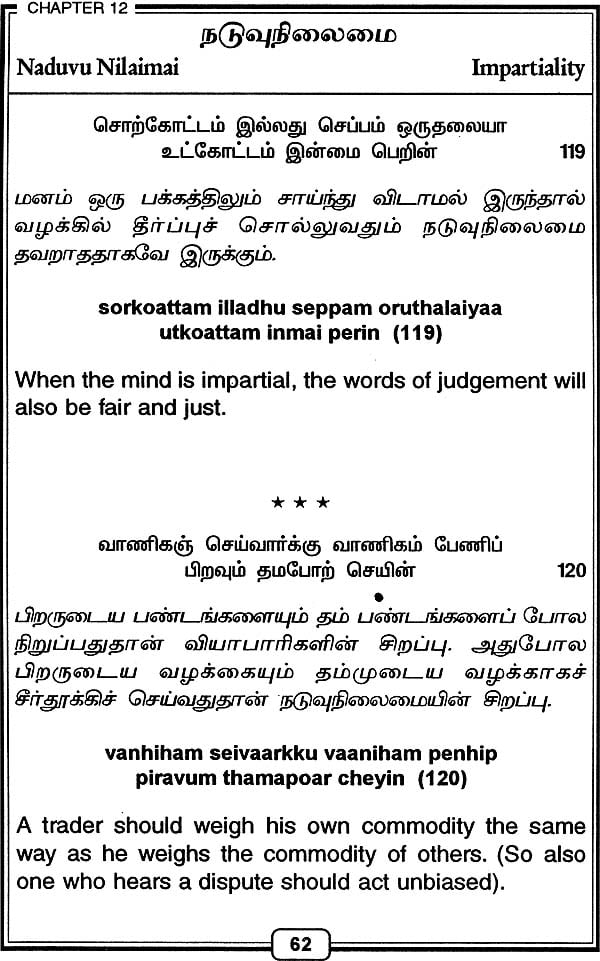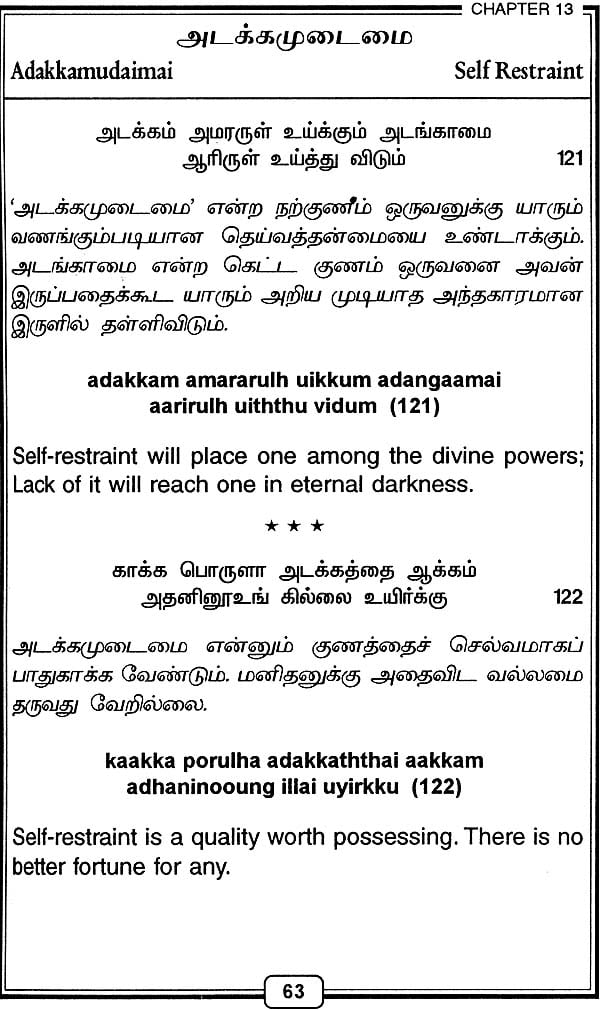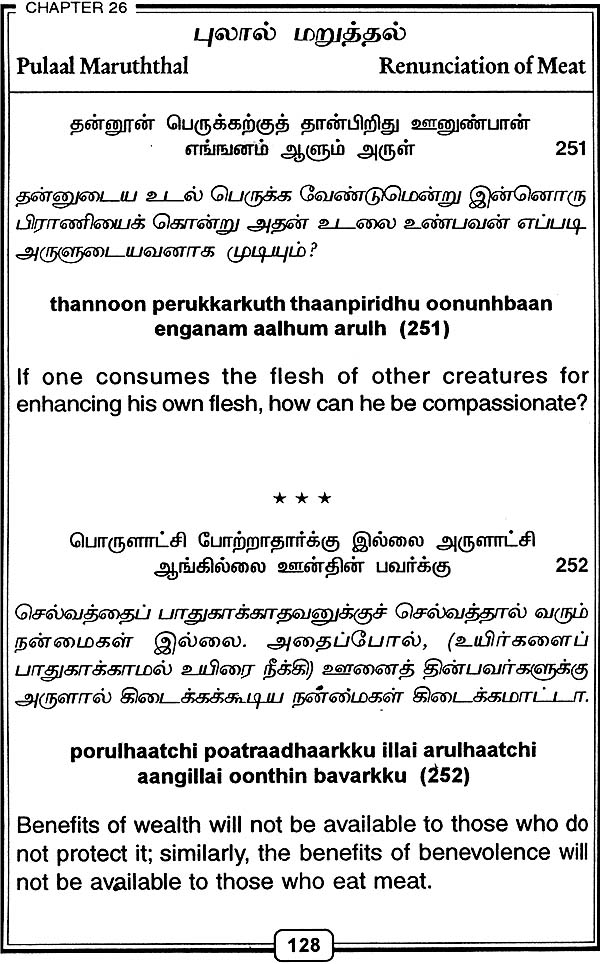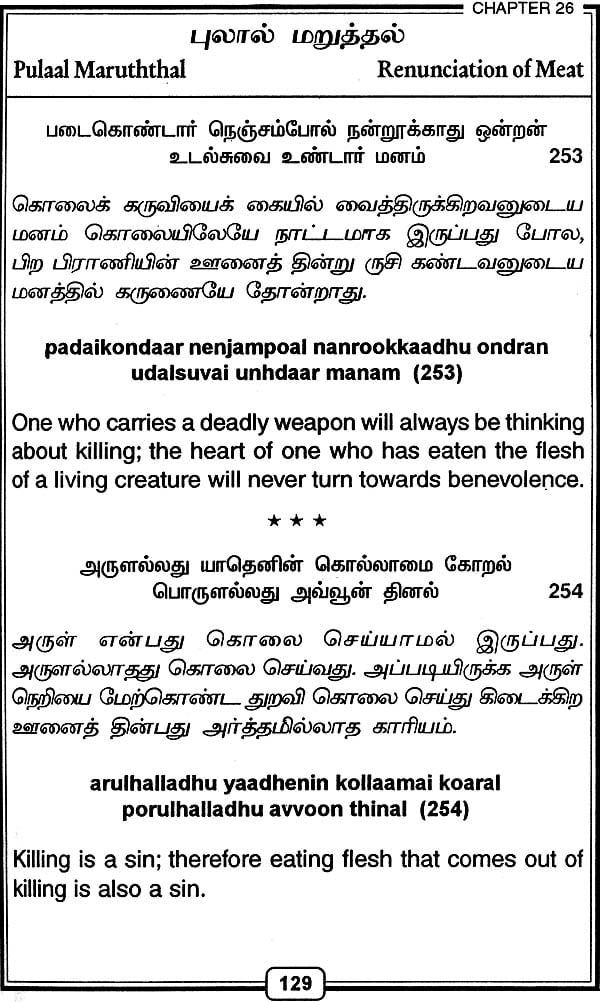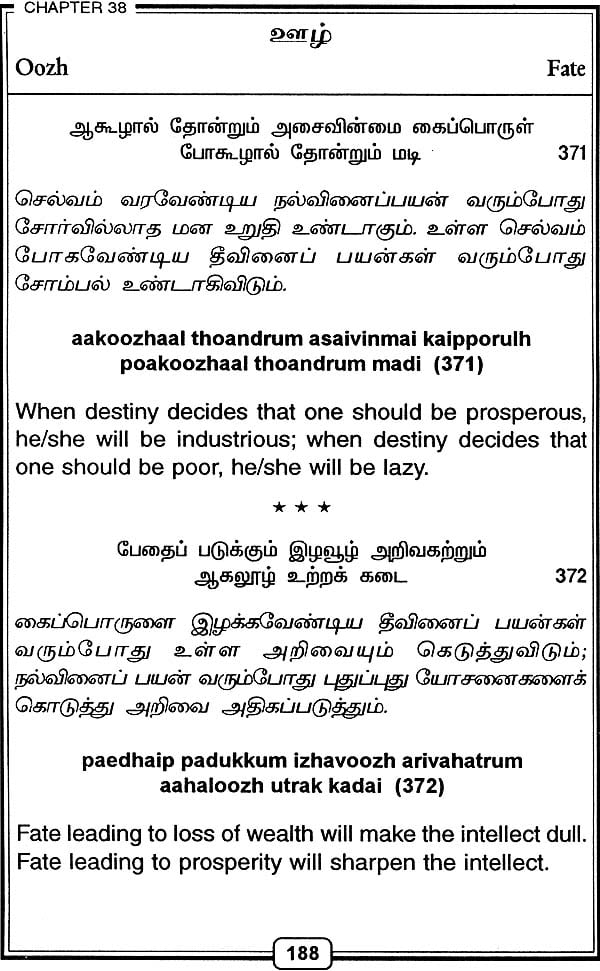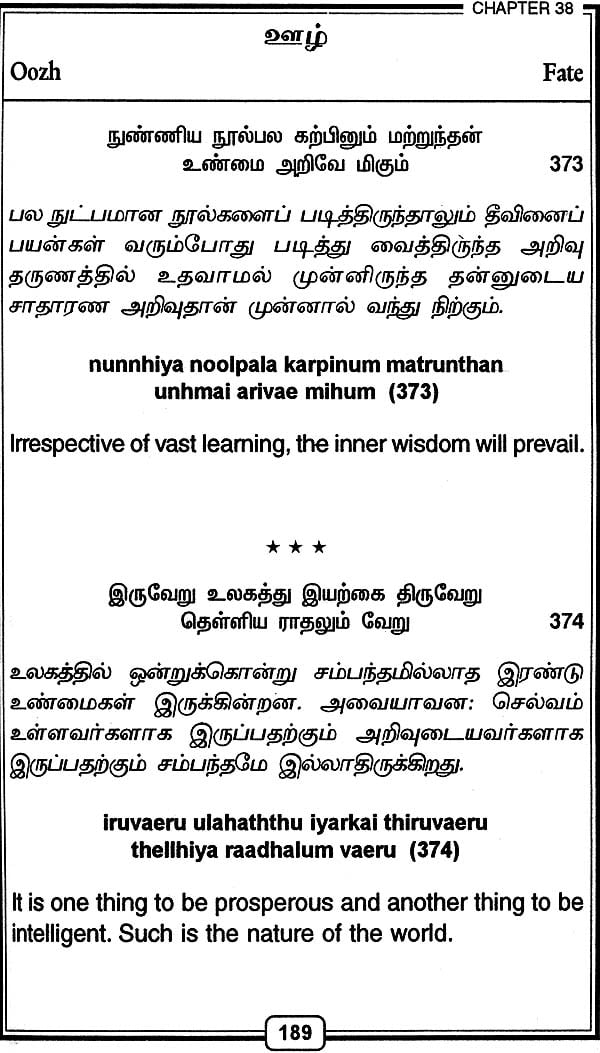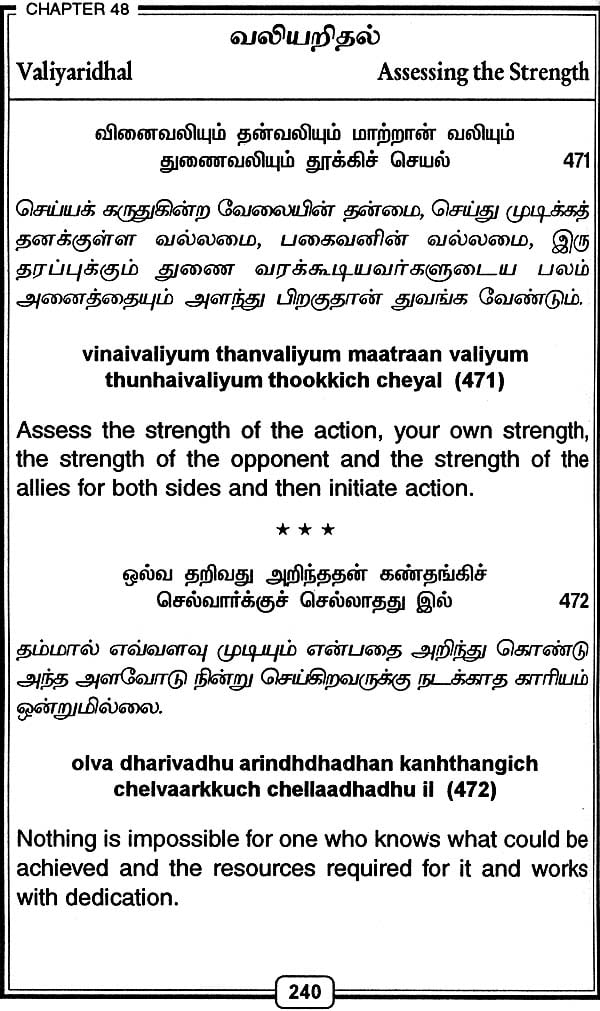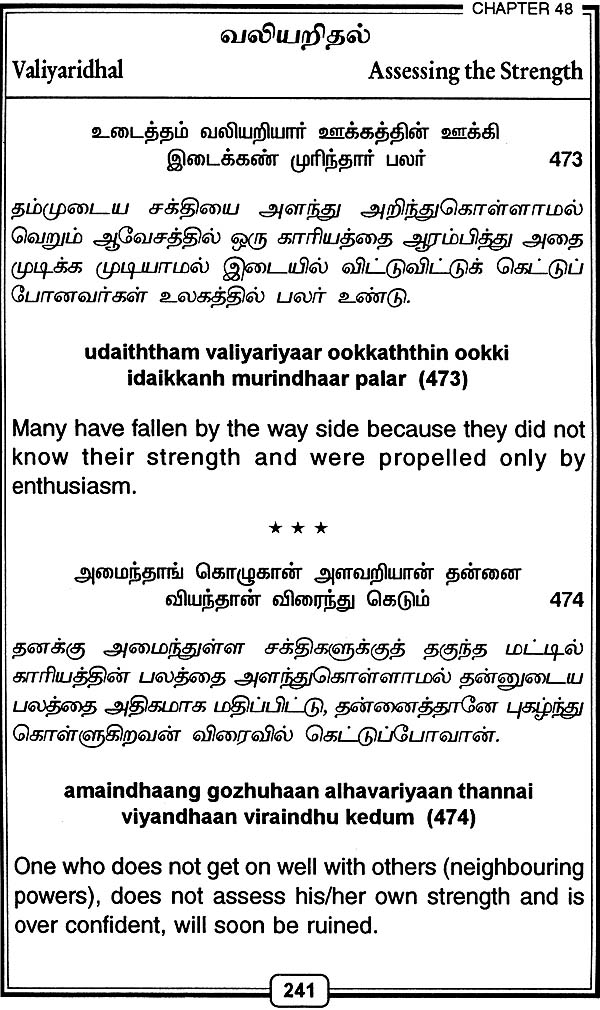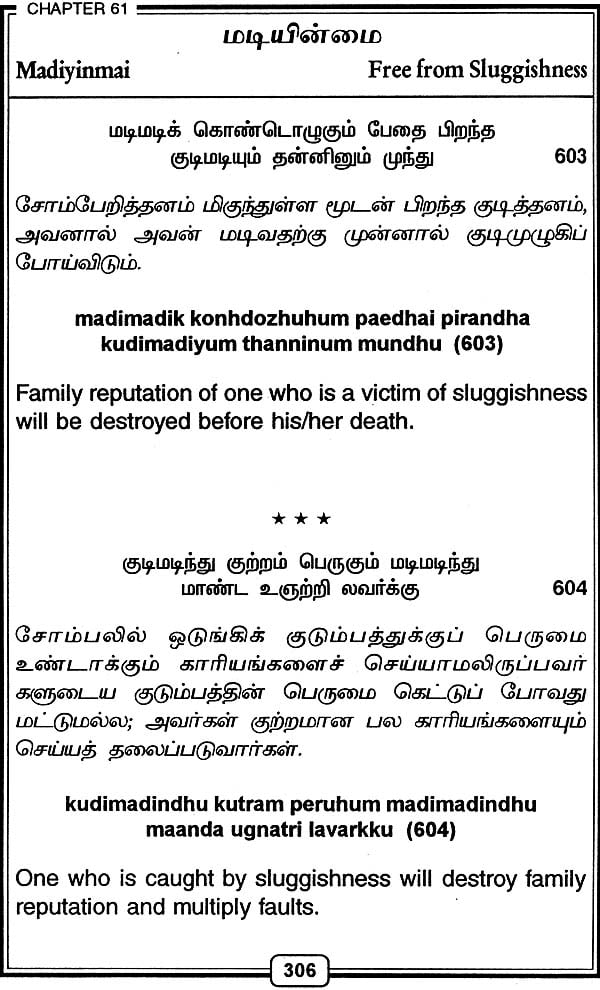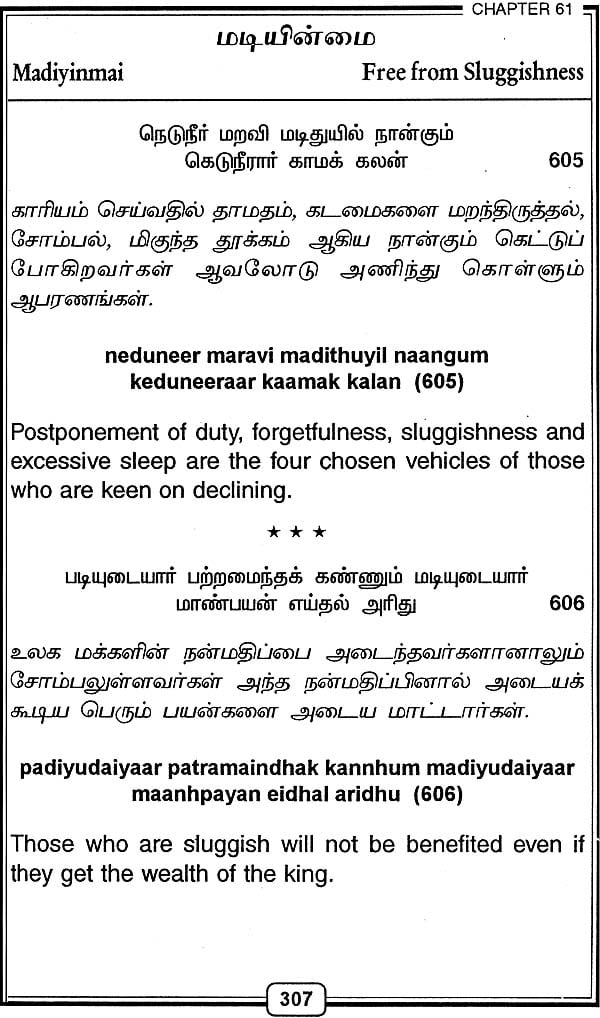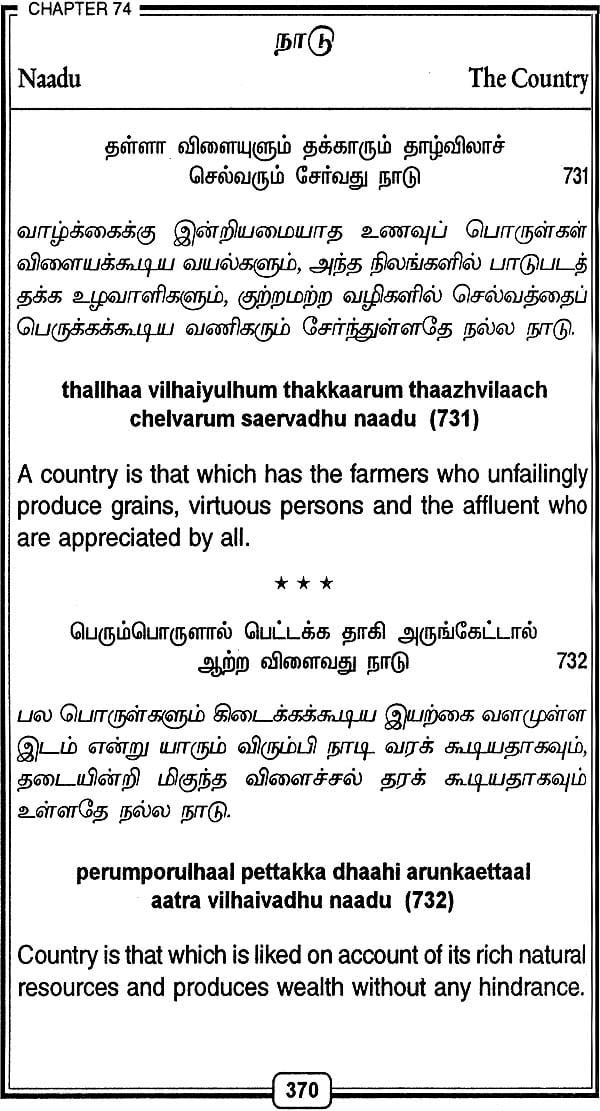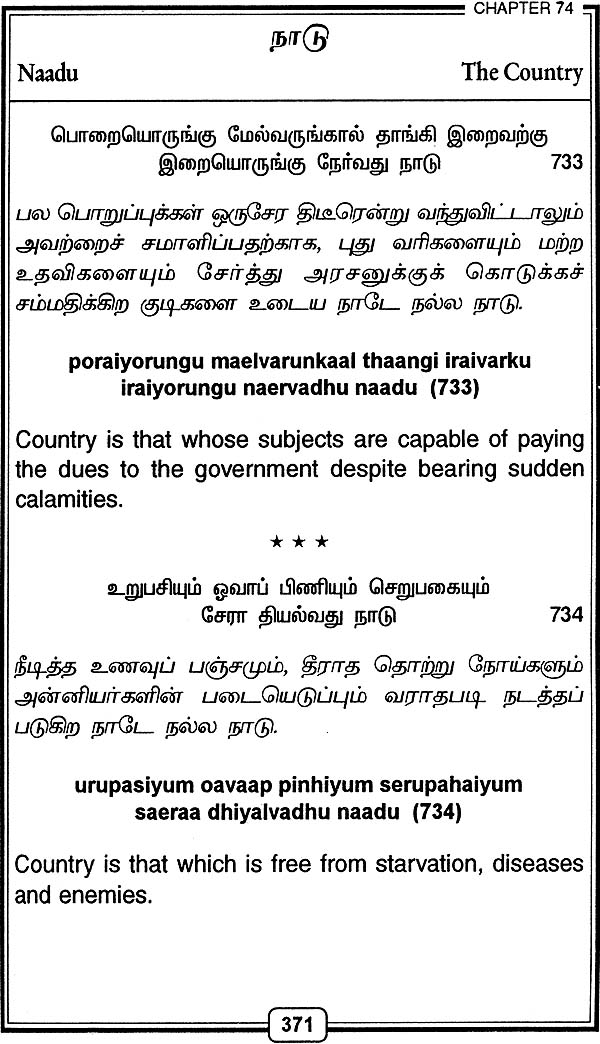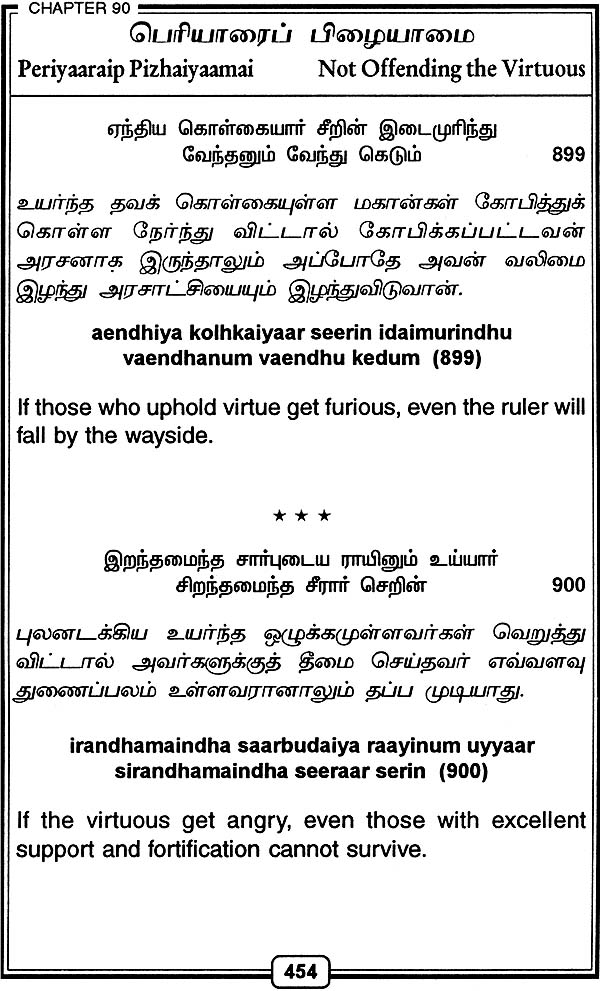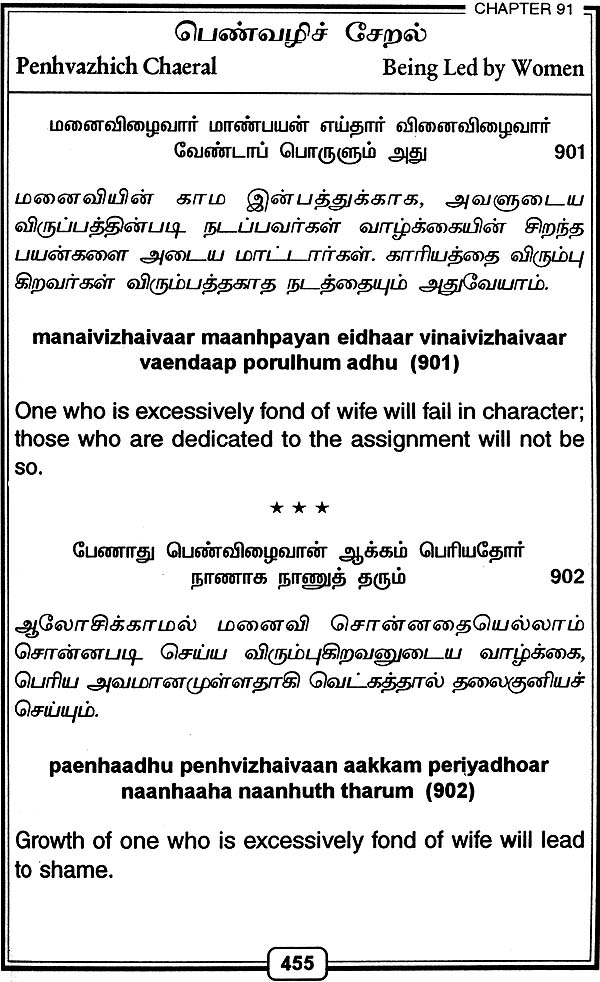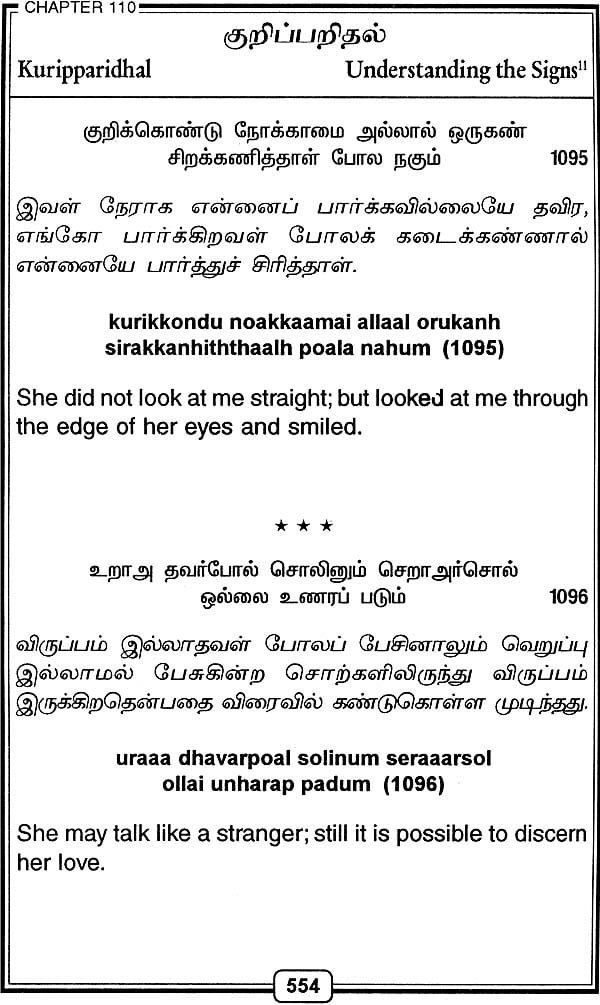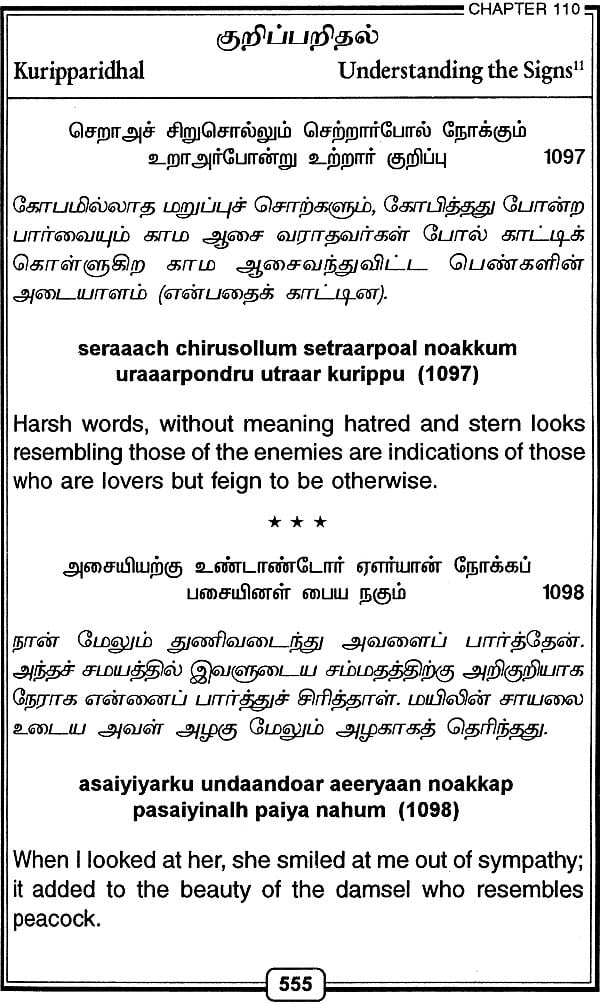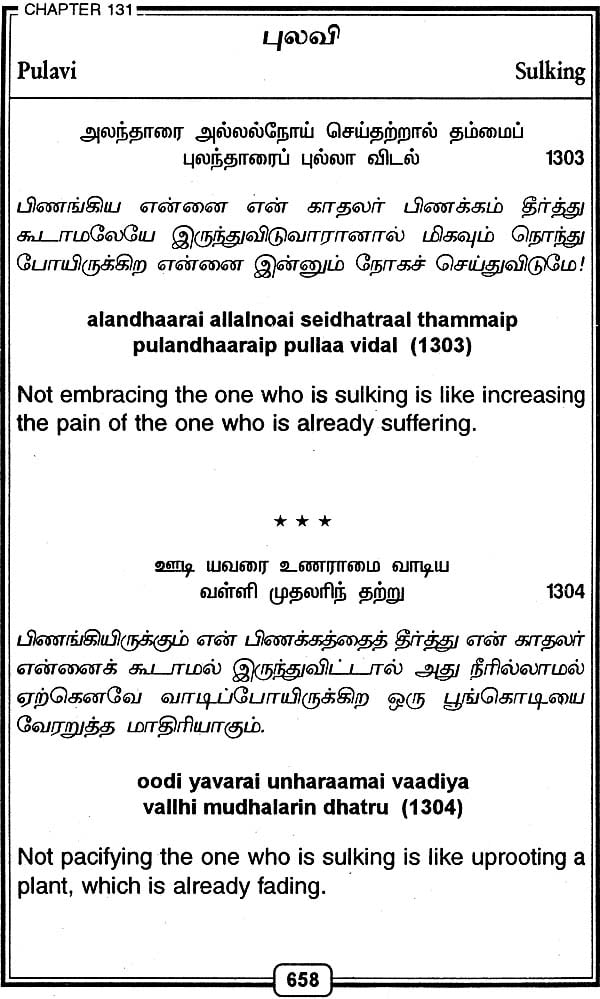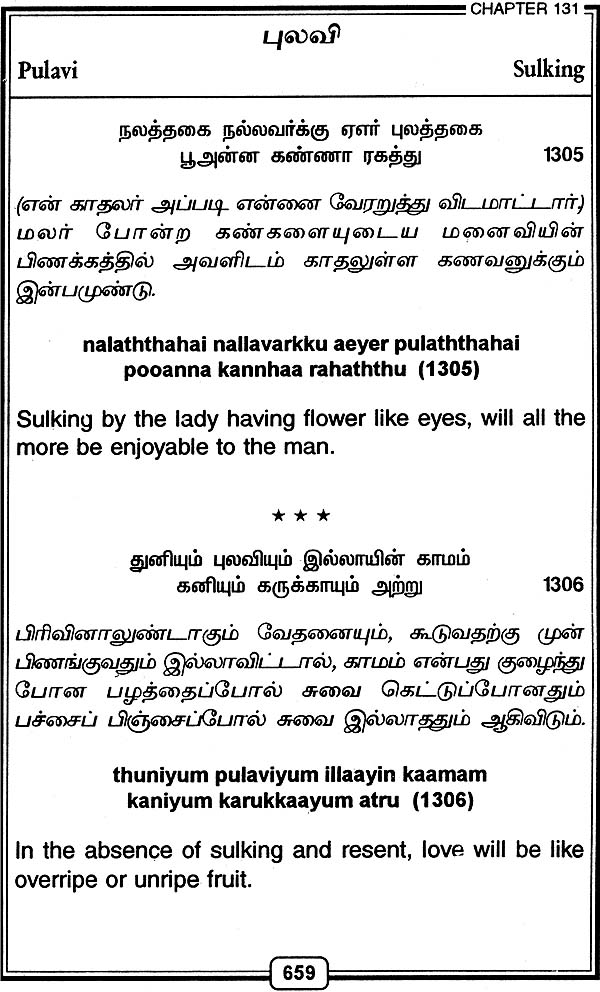
Thirukkural (Tamil Text, its Paraphrase, Roman Rendering and English Translation)
Book Specification
| Item Code: | NAF739 |
| Publisher: | RICHA PRAKASHAN |
| Language: | Tamil Text, its Paraphrase, Roman Rendering and English Translation |
| Edition: | 2005 |
| ISBN: | 8187062711 |
| Pages: | 690 |
| Cover: | Hardcover |
| Other Details | 9.0 inch x 6.0 inch |
| Weight | 900 gm |
Book Description
Written nearly 2000 years ago by Saint Thiruvalluvar, the Thirukkural is one of the earliest classics in Tamil language. In three parts-Aram, Porul and Imbam, i.e. virtue, wealth and Love, this book comprises of 1330 couplets organized in 133 chapters of 10 each. Each couplet is called ‘Kural Venba’, a form of poetry in Tamil. The coupltes are brief in form, but rich in content and have several effective metaphors. Occasional sarcasm and humour add to the beauty of this work.
The most admirable attribute of this book is its secular character. Relevant even in the present context, the Thirukkural contains valuable tips for rulers, managers, householders, and alike which are practicable in today’s scenario as well.
Significantly, this book does not mention the name of any country, king, cast, religion, god, Philanthropist or Philosopher. Apparently, the Thirukkural has been composed for the humanity at large, not dor propagating any religion, nor in the praise of any individual.
The Thirukkural is one of the earliest classics in Tamil language, which is believed to be an oldest language, being spoken still. Written nearly 2000 years ago by Saint Thiruvalluvar, it comprises 1330 couplets organized in 133 chapters of 10 each. Each couplet is called Kural Venba ', a form of poetry in Tamil. The couplets are brief in form, but rich in content and have several effective metaphors. Occasional sarcasm and humour add to the beauty of this work. For example, Kural says 'the mean are like angels; both act without restraint' and 'friendship with the fools is a blessing - there won't be any pain in parting'.
The most admirable attribute of this book is its secular character. 'Praise of God' is its first chapter, which does not refer to the God of any particular religion. Besides, the content in this work are relevant even in the present context. It contains valuable tips for rulers, managers, householders, and alike which are relevant and practicable in today's scenario too. 'Never honour the spy in public, it will expose him'' - this needs to be followed by modern day intelligence agencies as well. 'Before initiating action, consider the cost of the action, its outcome and the net result''- is an advice to be taken note of by the present day corporate managers.
Significantly, this book does not mention the name of any country, king, cast, religion, God, philanthropist or philosopher. Apparently, the Thirukkural has been composed for the humanity at large, not for propagating any religion, nor in the praise of any individual.
The Thirukkural has three parts—Aram, Porul and Inbam, i.e. Virtue, Wealth and Love.
The first part deals with the aspects of 'Virtue' - the moral values of life. Topics discussed in this part include Importance of Virtue, Domestic Life, Hospitality, Being Grateful, Impartiality, Self Restraint, Being Righteous, Patience, Shunning envy, Fear of Evil Deeds, Charity, Fame, Consistency, Truthfulness, Renunciation and Overcoming Desires.
The second part deals with 'Wealth' - not only about material wealth, but also about other wealths such as Education, Wisdom, etc. A good part of this book is also on statecraft. In this part topics such as Wisdom, Greatness of a Ruler, Listening to the Learned, Assessing the Strength, Assessing Time, Selection and Employment, Right Sceptre, Cruel Sceptre, Being Benign, Role of Ministers and Detectives, Power of Speech, Purity of Action, Friendship, etc. have been discussed.
The third part is on 'Love' where one can learn many aspects of love and affection. Subjects dealt in this part include Understanding the signs, Enjoying the union, Praising the beauty, Pain of separation, Anxiety of the eyes, Pain of solitude, Yearning to meet, Longing for union, Pleasure of sulking.
St Thiruvalluvar, the poet and a philosopher from Tamil Nadu, belongs to the First century B.C. (31 B.C.). He is believed to have from born in a weaver’s family and lived in Mylapore. There is also a view that he was born in Kanyakumari. To substantiate this claim, some scholars refer to the words used by Valluvar that are still in use in the southernmost part of Tamil Nadu.
In Tamil Nadu, the birthday of Thiruvalluvar (15th January) is celebrated as New Year Day’ (Thiravalluvar Year).
St. Thiruvalluvar depicts himself as a moral philosopher and a political scientist. As a great thinker, Thiruvalluvar, transgresses the frontiers of language and creed. His scripture of universalism has induced to recognize him as one of the greatest philosophers. 1330 Kurals deal with almost all a aspects of life, but nowhere does he mentions any country or caste or God or a King. This justifies the universally of his work. During his period, he was considered a revolutionary poet.
‘Richa Prakashan’ is dedicated to the publishing of spiritual, Religious & Yog books with a mission to enable the people of Indian origin, NRIS & Foreigners to read and understand these books.
Books such as Shree Raamcharitamaansa, Shreemad Bhagwad Gita, Hanumaana Chaaleesaa, Sachitra Shiva Chaaleessa, Sundarkaanda, Sachitra Aaratee Sangraha & other similar books have been published. Reading Has been published. Reading has been made easy through Ramanized English & authentic Hindi English translations.
Lately books in regional languages like Bangla (Shree Kaalee chaaleessa, Shree Durga Chaaleessa), Gujarati (Shree Hanumaana Chaleessa)& French (Thirukkural) have also been developed on the same pattern. Such efforts are made specifically for our friends abroad- who are unable to read to read the original text written in Hindi/Sanskrit/regional languages but wish to read these books.
At the same time, numerous Yog books on varied subjects like spine, obesity, olde-age, diabetes, etc have also been published under Richa Prakashan. Various ‘asans’ have been explained with their objectives, areas affected, their do’s & don’ts, amongst other topics.
While developing these books, Quality- both in terms of production of these books & in providing authentic content, has been our prime area of focus.
The Thirukkural is one of the earliest classics in Tamil language, which is believed to be an oldest language, being spoken still. Written nearly 2000 years ago by Saint Thiruvalluvar, it comprises 1330 couplets organized in 133 chapters of 10 each. Each couplets are brief in form, but rich in content and have several effective metaphors. Occasional sarcasm and humour add to the beauty of this work. For example, Kural says ‘the mean are like angels; both act without restraint and friendship with the fools is a blessing- there won’t be any pain in parting.
The most admirable attribute of this book is its secular character. ‘praise of God’ is its first chapter, which does not refer to the God of any particular religion. Besides, the content in this work are relevant even in the present context. It contains valuable tips for rulers, managers, householders, and alike which are relevant and practicable in today’s scenario too. ‘Never honour the spy in public, it will expose him’-this needs to be followed by modern day intelligence agencies as will. ‘Before initiating action, consider the cost of the action, its outcome and the net result’- is an advice to an taken note of by the present day corporate managers.
Significantly, this book does not mention the name of any country , King, Cast, religion, God, Philanthropist or Philosopher. Apparently, the Thirukkural has been composed for the humanity at large, not for propagating any religion, nor in the praise of any individual.,p> The Thirukkural has three parts-Aram, Porul and Imbam, i.e. virtue, Wealth and Love.
The first part with the aspects of ‘Virtue’- the moral values of life. Topics discussed in this part include Importance of Virtue, Domestic Life, Hospitality, Being Grateful, Impartilaity, Self Restraint, Being Righteous ,Patience, Shunning envy, Fear of Evil Deeds, Charity, Fame, Consistency, Truthfulness Renunciation and Overcoming Desires.
The second part deals with ‘Wealth’-not only about material wealth, but also about other wealths such as Education, Wisdom, etc. A good part of this book is also on statecraft. In this part topics such as Wisdom, Greatness of a Ruler, Listening to the Learned, Assessing the strength. Assessing Time, Selection and Employment, Right scepter, Cruel Sceptre, Being Benign, role of Ministers and Detectives, Power of speech, Purity of Action, Friendship, etc. have been discussed.
The third part is on ‘Love’ where one can learn many aspects of love and affection. Subjects dealt in this part include Understanding the sign, enjoying the union, praising the beauty, pain of separation, Anxiety of the eyes, Pain of solitude, Yearning to meet, Longing for union, pleasure of sulking.
| Thirukkural & Thiruvalluvar | iii-iv |
| Publisher's Note | v-vi |
| Tamil Letters & Sounds | vii-xi |
| Virtue | 1-192 |
| In Praise of God | 3 |
| Glory of the Rain | 8 |
| Greatness of Ascetics | 13 |
| On the Iprotance of Virtue | 18 |
| Domestic Life | 23 |
| Life companion | 28 |
| Wealth of Children | 33 |
| Possession of Love | 38 |
| Hospitality | 43 |
| Speaking Sweetly | 48 |
| Being Grateful | 53 |
| Impartiality | 58 |
| Sef Restraint | 63 |
| Being Righteous | 68 |
| Not Lusting Another's Wife | 73 |
| Patience | 78 |
| Shunning Envy | 83 |
| Not Coveting | 88 |
| shunning Backbiting | 93 |
| shunning from vain Words | 98 |
| Fear of Evil Deeds | 103 |
| Rendering Help | 108 |
| Charity | 113 |
| Fame | 118 |
| Possession of Benevolence | 123 |
| Renunciation of Meat | 128 |
| Penance | 133 |
| Inconsistent Coduct | 138 |
| Absence of Fraud | 143 |
| Truthfulness | 148 |
| Overcoming Wrath | 153 |
| Refraining from Hurting | 158 |
| Not killing | 163 |
| Impermanence | 168 |
| Renunciation | 173 |
| True knowledge | 178 |
| Overcoming Desires | 183 |
| Fate | 188 |
| Wealth | 193-544 |
| Greatness of the Urler | 195 |
| Educatiion | 200 |
| Not Learing | 205 |
| Listening | 210 |
| wisdom | 215 |
| Correction of Faults | 220 |
| Seeking the Help of Elders | 225 |
| Avoiding Mean Company | 230 |
| Evaluated Action | 235 |
| Assessing the Strength | 240 |
| Assessing time | 245 |
| Assessing the Place | 250 |
| Confiding After Selesction | 255 |
| Selection and Employment | 260 |
| Cherishing the Relatives | 265 |
| Not Being Forgetful | 270 |
| Right Sceptre | 280 |
| Cruel Sceptre | 285 |
| Abstaining from Terrorism | 290 |
| Being Benign | 295 |
| Detectives | 300 |
| Being Energetic | 305 |
| Free from Sluggishenss | 310 |
| In praise of Striving | 315 |
| Fortitude | 320 |
| Ministers | 325 |
| Power of Speech | 330 |
| Purity of Action | 335 |
| Power of Action | 340 |
| Mode of Execution | 345 |
| Envory | 350 |
| Moving with the Ruler | 355 |
| Understanding Indications | 360 |
| Understanding the Assembly Not Dreading the Assembly | 365 |
| The Conutry | 370 |
| Fort | 375 |
| Accumulating Wealth | 380 |
| Excellence of Army | 385 |
| Martial Spirit | 390 |
| Friendship | 395 |
| Scrutiny of Friendship | 400 |
| Familiarity | 405 |
| Evil friendship | 410 |
| Unreal Friendship | 415 |
| Foolishness | 420 |
| Ignorance | 425 |
| Hostitlity | 430 |
| Might of Hatred | 435 |
| Analysing Hatred | 440 |
| Internal Enemies | 445 |
| Not Offending the Virtuous | 450 |
| Beiong Led by women | 460 |
| Prostitutes | 465 |
| Abstaining from Liquor | 470 |
| Gambling | 475 |
| Medicine | 480 |
| Citixenship | 485 |
| Honour | 490 |
| Greatness | 495 |
| perfectness | 500 |
| Courtesy | 505 |
| Unused Wealth | 510 |
| Sense of Shame | 515 |
| Maintaining Family Agriculture | 520 |
| Poverty | 525 |
| Begging | 530 |
| Avoiding Begging | 535 |
| Meanness | 540 |
| Love | 545-671 |
| Pain from the Beauty | 547 |
| Understanding the Signs | 552 |
| Enjoying the Union | 55 |
| Praising the Beauty | 562 |
| Reiterating Love | 567 |
| Crossing Bashfulness | 572 |
| Gossiping | 577 |
| Pain of Separation | 582 |
| Pining (Loss of health) | 587 |
| Anxiety of the Eyes | 592 |
| parting pain that pales | 597 |
| Pain of Solitude | 602 |
| Painful Recollection | 607 |
| Narrating the Dreams | 512 |
| Pain of the Evening | 617 |
| Loss of Beauty | 622 |
| Addressing the Heart | 627 |
| Getting Exposed | 632 |
| yearning to meet | 637 |
| Indicating through sings | 642 |
| Longing for Union | 647 |
| Complaints Against the Heart | 652 |
| Sulking Intricate Sulking | 657 |
| Intricate Sulking | 662 |
| Pleasure of Sulking | 667 |
| Refernces | 673 |
